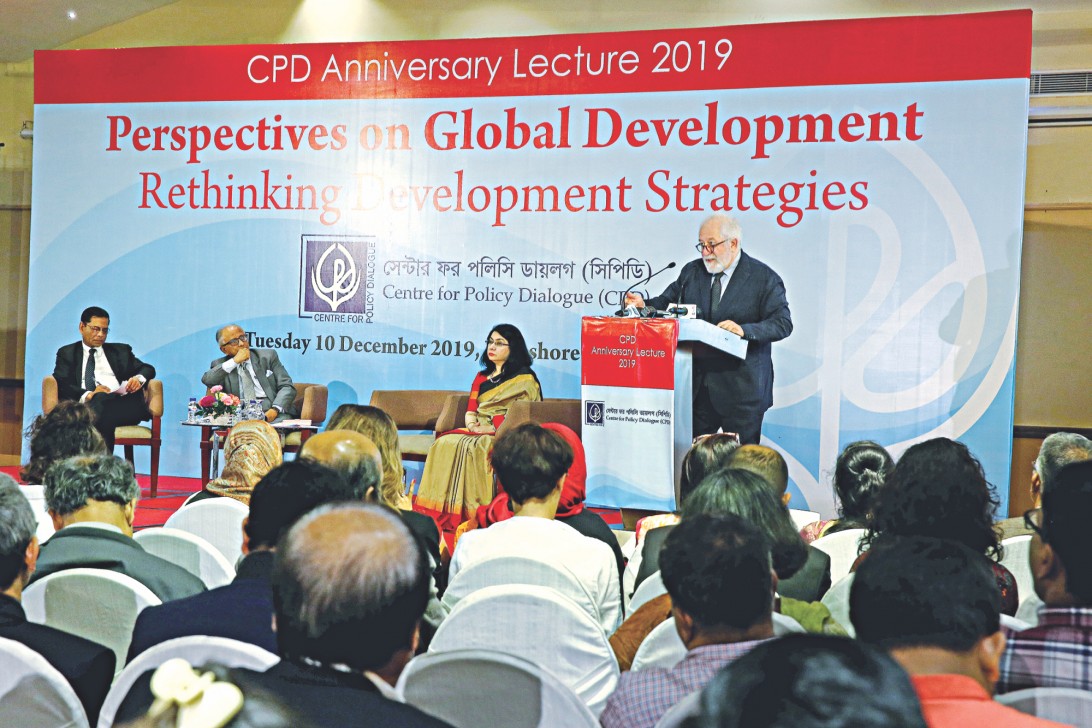Redesign development strategies to meet people’s needs

Governments should redesign development strategies by reducing reliance on growth-oriented thoughts in order to tackle social and political discontents, said Mario Pezzini, director of the Paris-based OECD Development Centre, yesterday.
“They also need to take comprehensive approach to building development strategies, which effectively meet people’s need,” he said.
Ensuring social protection with productive human resources and providing required public services, including education and health, could be the indicators for development, he said.
He spoke while delivering a lecture titled “Perspectives on Global Development: Rethinking Development Strategies” at the Lakeshore hotel in Dhaka. The Centre for Policy Dialogue (CPD) organised the event.
A number of countries, which have clocked in higher economic growth, are facing social and political unrest as governments have failed to ensure basic components for people.
“GDP-related indicators have long been at the core government policy actions, yet this kind of composite index does not adequately reflect people’s living standard,” said Pezzini, who joined the Organisation for Economic Co-operation and Development (OECD) in 1995.
Instead, multidimensional frameworks, such as well-being indicators, draw a better picture of people’s need and can, therefore, be a tool for policymakers to design and implement reforms, he said.
The heterogeneity of the developing world has indeed created a new geography of poverty, according to Pezzini, who was a professor in industrial economics at the Ecole Nationale Supérieure des Mines de Paris as well as in US and Italian universities prior to joining the OECD.
In 1987, nine out of 10 extremely poor people lived in low-income countries. But by 2015, only four out of 10 lived in the low-income countries.
Today, half of the world’s poor live in just five countries: India, Nigeria, the Democratic Republic of Congo, Ethiopia, and Bangladesh.
Pezzini said increased inequality has been a long time in the making.
“After a historical decline, both income and wealth inequality are on the rise again in nearly all countries,” he said.
Against the backdrop, social discontent and protest movements have recently flared across the globe.
While Chile saw its economy grow, its development model did not provide for the sharing of these gains among all its citizens.
“This has resulted in stark income and wealth inequality. A few weeks ago, the country experienced the largest protest in its history, which could lead to a reform of its constitution,” Pezzini said. In Bolivia, while indicators have shown impressive socio-economic progress over recent years, people feel disconnected from the government, which faced allegations of corruption during its last election. The country quickly plunged into huge political uncertainty.
As protests spread from country to country, demanding various structural reforms, some commonalities can be drawn, said Pezzini.
First, governments did not anticipate the protests. This is symptomatic of a growing disconnection between governments’ perception of people’s well-being and the reality.
Second, feelings of discontent with policies that are perceived as unfair and harmful to people’s well-being are often root causes of social unrest.
Third, in many cases, protests are waged against the system, rather than aimed at a particular government or over one specific issue.
“Governments need to dig deeper to understand the root cause behind these unrests as the usual policy remedies do not seem to work anymore,” Pezzini said.
“Global responses and national reforms must be built on solid evidence of current economic and social realities, a better understanding of people’s concerns, and outside-the-box policy solutions.”
Pezzini said the situation has necessitated government initiatives to upgrade the set of indicators they use to anticipate and better understand the perception and realities of their people.
M Syeduzzaman, a member of the CPD Board of Trustees and a former finance minister, chaired the event. Mustafizur Rahman, a distinguished fellow of the think-tank, and Fahmida Khatun, executive director, also spoke.
